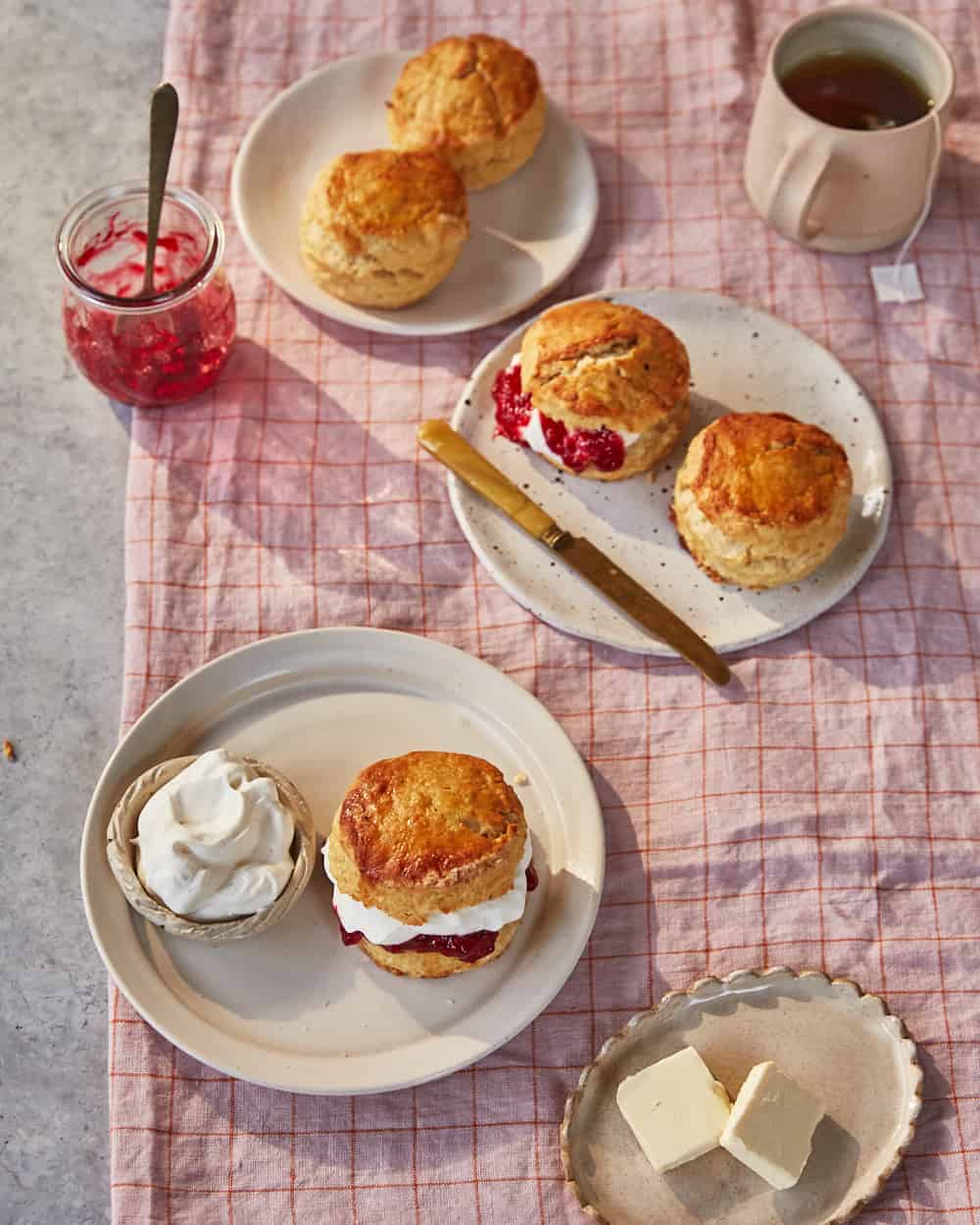These vegan, English-style scones are tall, fluffy and easy to make. Perfect for tea-time with jam & dairy-free whipped cream.

Can you make vegan scones?
Whilst traditionally, scones are made using animal products like butter, milk/yoghurt and eggs, it’s easily possible to make them out of vegan alternatives! The most important part is to use a nice, firm vegan block butter – my favourite brand is Naturli as it doesn’t have any palm oil in it and has a really firm texture! In place of the milk, the switch is simple to use soy milk. In place of the eggs, you can either leave them out or use an egg substitute such a flaxseeds or oats (see below).
Tips for making the best vegan scones
- Freeze the butter: As vegan block butter is generally softer than dairy butter, we need to help firm it up a bit first. I cut the butter into small cubes, pop onto a plate and freeze for around 10 minutes as I get my other ingredients ready. This helps keep the fat solid as you mix the dough which will help give you light, fluffy scones.
- Roll the dough out THICK: you may be tempted to roll the dough out thinner than the suggested 3cm but the only way to get super tall scones is to start with a thickly rolled dough.
- Laminate the dough: when rolling out the dough, we cut it in half and sandwich the halves together, twice. This adds layers to the dough which gives the scones that characteristic, craggy look when baked.
- Freeze the dough before cutting: if the dough, once rolled out, seems a bit soft – place it onto a baking tray and give it a quick trip to the freezer (for 10-15 minutes). This will firm up the dough which will help you get very clean cuts when cutting the scones out with the round cutters.
- Don’t twist the cutter: when cutting out the scones make sure you use a straight down-up movement. If you twist the cutter when punching out the scones you can seal the edges of the dough which can hinder the scones rise.
- Try to re-roll the scraps as few times as possible: every time you re-roll the scraps, the gluten network becomes more developed. This leads to a tougher scone!
- Eat ASAP: vegan scones tend to stale faster than non-vegan scones so it’s best to eat them on the day they’re made, warm from the oven preferably. Cold/day old scones can be split in half and toasted which will help revive them before serving.


Vegan Scones Recipe
Ingredients
- 100 g (7 tbsp) vegan block butter I like Naturli
- 150 ml (1/2 cup + 2 tbsp) non-dairy milk soy milk works best
- 1 tbsp apple cider vinegar, white vinegar or lemon juice
- 2 tbsp porridge oats (rolled oats)
- 50 ml boiling water
- 360 g (3 cups) plain white flour (all-purpose flour)
- 50 g (3 tbsp) granulated sugar
- 1 tbsp + 1/2 tsp baking powder
- 1/4 tsp fine table salt
for brushing:
- 1 tsp golden syrup or maple syrup
- 2 tsp soy milk
Instructions
- Place butter into freezer as you prep your other ingredients.100 g (7 tbsp) vegan block butter
- Combine the soy milk and apple cider vinegar in a jug, set aside.150 ml (1/2 cup + 2 tbsp) non-dairy milk, 1 tbsp apple cider vinegar, white vinegar or lemon juice
- Combine the oats and boiling water in a small bowl, set aside.2 tbsp porridge oats (rolled oats), 50 ml boiling water
- Combine the flour, sugar, baking powder and salt in a medium bowl.360 g (3 cups) plain white flour (all-purpose flour), 50 g (3 tbsp) granulated sugar, 1 tbsp + 1/2 tsp baking powder, 1/4 tsp fine table salt
- Preheat the oven to 200°C fan (220°C non-fan) and line a baking tray with baking paper.
- Add the chunks of frozen vegan butter to the dry ingredients. Use your fingertips to rub the butter into the dry ingredients until no large chunks of butter remain. The mixture should have a sandy, crumbly texture.100 g (7 tbsp) vegan block butter
- Combine the bowl of oat mixture with the jug of curdled soy milk. Pour this into the bowl of flour mixture and stir together until just combined – you may need to mix by hand for the last few seconds.
- Tip everything out onto a clean work surface and pat the dough out into a rectangle. If it seems a bit sticky, lightly dust on top and underneath the dough with some flour. Cut the dough in half and then stack one half on top of the other. Pat out again until the dough is 3 cm (1 inch) thick. Use a 6 to 7 cm (~2.5 inch) cutter to cut the dough into circles. Gently re-roll any scraps and cut out more scones – you should get about 8 scones.
- Place the scones onto the baking tray. Mix the golden syrup and soy milk in a small bowl until the syrup has dissolved. Use this mixture to brush the tops of the scones.1 tsp golden syrup or maple syrup, 2 tsp soy milk
- Bake the scones for 15-20 minutes until well risen, and deep golden on top.
Video

Notes
Vegan Scone Variations:
Vegan Scones with Raisins
Incorporate 70g of raisins (or other dried fruit) into the dough along with the milk etc.
Vegan Chocolate Chip Scones
Incorporate 100g vegan chocolate chips or roughly chopped chocolate into the dough along with the milk etc.
Vegan Blueberry or Raspberry Scones
Incorporate 150g frozen blueberries or raspberries into the dough along with the milk etc. When rolling out the dough for lamination, only cut in half and stack once. You may need to bake for 5 minutes longer.
Vegan Lemon Scones
Finely grate the zest of two lemons into a small bowl. Add the granulated sugar and rub together with your fingertips to release the oils from the zest. Once the scones have baked, mix a bit of icing sugar with a small amount of lemon juice to get a thick glaze and pour this over the scones.

How long do vegan scones last?
Vegan scones tend to go stale quicker than conventional scones as the lack of eggs can make them dry out faster. Because of this, it’s definitely best to eat them warm from the oven on the day they’re made. They will last for 2-3 days more in an airtight container at room temperature – I just advise either splitting and toasting them or re-warming in a 180°C oven for 10-15 minutes before you eat them. The re-warming/toasting of the scones helps to temporarily de-stale them. Don’t keep them in the fridge as they will go stale quicker in there.
Freezing baked vegan scones
If you want to store baked scones for longer, freeze the scones on the day they’re baked, after they’ve cooled. Just pop them into a resealable sandwich bag, label & date them and keep in the freezer for up to 3 months. To defrost, remove from the bag, place onto a tray and into a preheated oven at 180°C for 15-20 minutes.
Freezing scone dough & baking from frozen
You can also bake scones from frozen. To do this, cut the scone dough out as directed and place onto a baking tray but don’t bake. Freeze until solid (around 1 hour) then tip into a resealable sandwich bag, label & date them and keep in the freezer for up to 3 months. To bake from frozen, preheat the oven to 200°C/400°F fan (220°C/430°F non-fan) and line a baking tray with baking paper. Bake the scones for 20-25 minutes until well-risen and golden.
Ingredients for vegan scones
- Plain white flour: you want a plain flour or pastry flour here. Don’t use bread/strong flour as it has too high a gluten content and will make your scones dense! If you have self-raising white flour you can use that in place of the plain flour, just omit the baking powder
- Baking powder: this is the raising agent for the scones. There’s quite a lot of it but it is needed to help the dough climb tall in the oven.
- Granulated sugar: adding a small amount of sugar to the dough adds a slight sweetness, perfect when you’re having scones with sweet toppings. If you want to make savoury scones, omit the sugar. I use granulated sugar as it’s cheaper but you can use caster sugar if you like.
- Salt: this is needed to help enhance the buttery flavours in the scones. Don’t forget it!
- Vegan block butter: it’s important to use a block butter instead of a tub margarine here as the solid fat content is lower. We need the solid fat to help produce a soft crumb so using tub margarine can lead to denser scones.
- Oats + boiling water: this is the replacement for eggs in this scone recipe. The mixture helps bind the dough and adds extra moisture.
- Soy milk + vinegar: this is the replacement for buttermilk! You can use an unsweetened, vegan soy yoghurt in place of the milk + vinegar if you like. The vinegar introduces acidity and helps curdle the soy milk. I prefer to use soy milk here as it has a higher protein content (so works well in baking) but oat milk or coconut milk will also work well.
How to make vegan scones
- Cube and freeze the vegan butter.
- Combine the soy milk & vinegar to curdle.
- Soak the oats in the boiling water.
- Rub the frozen butter chunks into the dry ingredients until you get a mealy texture
- Combine the soaked oats and curdled soy milk. Mix into the wet ingredients.
- Pat the dough out, cut in half, stack the halves. Repeat once more.
- Roll the dough out to 3cm thick, cut into 6-7cm rounds. Place onto a lined baking tray.
- Brush the scones with a mixture of golden syrup and soy milk.
- Bake for 15-20 minutes until well risen and golden.
- Serve warm with vegan butter or cream, and jam.
What to use instead of eggs in scones
My favourite replacement for eggs in scone recipes is a simple mixture of boiling water and oats. The oats absorb the boiling water making a thick paste. This, when allowed to cool, can be mixed into the dough with the liquid ingredients. It helps to introduce extra moisture to the scone dough without making it too wet, helping the scones to stay soft.
For every one egg: Use 2 tbsp rolled oats (porridge oats) + 60ml boiling water. Combine & allow to sit for 5 minutes to cool.
Vegan butter vs coconut oil
In scones we need to use a saturated fat, which is solid at room temperature, to get the right texture. These solid fats give more of a tender, flaky texture to things like pastry and scones. I prefer to opt for a vegan block butter for the solid fat here as it has a buttery flavour, solid texture and has a similar amount of water to that of dairy butter. You can use coconut oil (another saturated fat) instead of the vegan butter if you prefer – I mainly don’t do this as (a) virgin coconut oil will give the scones a coconutty flavour vs (b) refined coconut oil, whilst having a neutral flavour, won’t impart any of the buttery aromas you get from vegan block butter. Also, I’m more likely to have vegan butter to hand so I prefer to make my scones without coconut oil.

